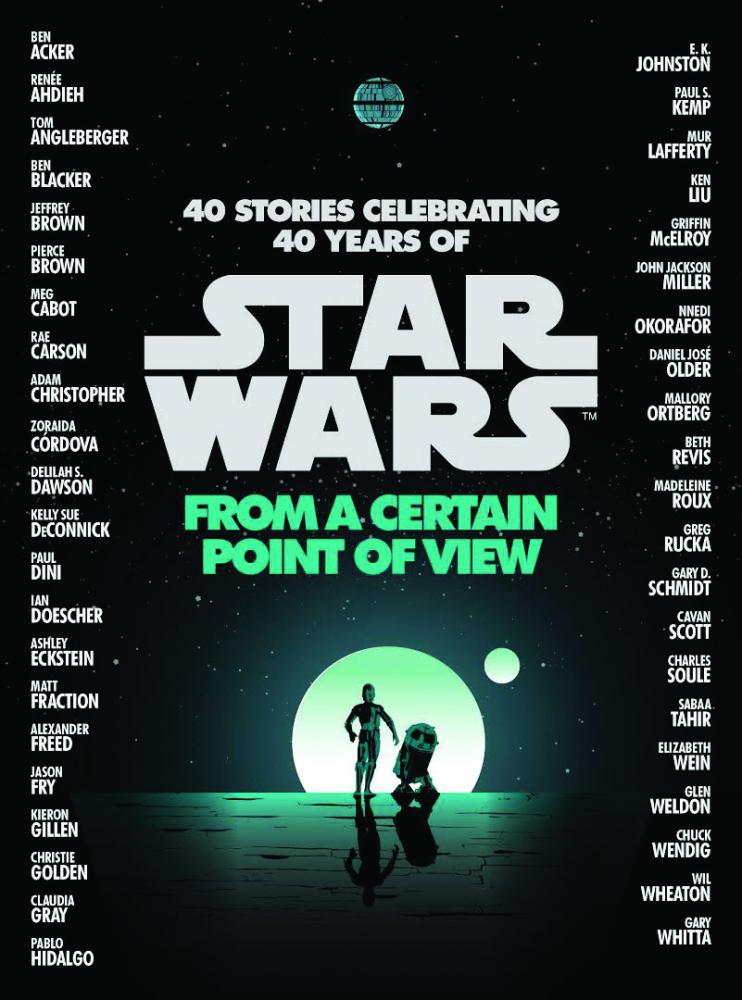‘Star Wars’ anthology gives life to unseen moments
Be it the passion of fans, the desire of creators or the wiles of capitalism, much-loved works are often doted upon with countless spinoffs and stray material. “Breaking Bad” has “Better Call Saul,” “Avatar: The Last Airbender” has “Legend of Korra” and “Star Wars” has a seemingly never-ending stream of sequels, prequels, sequels to prequels that are prequels to the original and an ever-expanding universe of novels, animated series, video games and short stories.
“Star Wars: From a Certain Point of View,” released Oct. 3, is a canonical collection of 40 stories celebrating 40 years of “Star Wars.” The anthology fills in the gaps of the original “Star Wars” film, each story giving us a glimpse of “a certain point of view.” Authors of all stripes — science fiction enthusiasts, children’s book writers, comic artists, wacky novelists and the like — present for us the moments in between but not forgotten.
Among them is Gary Schmidt, a professor in the English department at Calvin. In his story “There Is Another,” we journey with Yoda from his highland Dagobah home to the swamp hut where we meet him in “The Empire Strikes Back.” He is alone, contemplative. He gathers his few belongings and walks us through his memories that show “the world of what might have been.”
Schmidt evokes a tenderness that suits the character of Yoda as we know him, a still sadness that resides in the quiet space beneath cynicism and humor. In one sorrowful moment, Yoda remembers the lightsaber he lost, the one that never made it to the hands of Leia, the promising future Jedi.
Many other stories in the collection develop characters with whom we are not already intimately familiar. These protagonists, nameless passers-by in “Star Wars” as we know it, become known.
Acclaimed science fiction writer Nnedi Okorafor’s “The Baptist” brings us to the swampy planet Vodran, from which we are immediately ripped away and thrown into a glass jar with Omi, a dianoga. Like her, we are disoriented, uneasy. The story — like many in the collection, where new fates cannot simply be thrust upon the canon of the plot — rolls along to the obvious, yet unhappy, end.
But still we grasp a hint of hope. Unlike Yoda’s seasonal habitation in the swampland of Dagobah, Omi has lived on the swampy planet Vodran her whole life. Okorafor drops us into a moment of wonder, majesty: while speeding across the galaxy, before she tumbles into the trash chute of the Death Star, Omi catches a glimpse, for the first time, of the stars.
Where these tales expose delicate intimacy with beings new and old, others seize opportunity for curt attitudes and unceremonious solutions. In Mallory Ortberg’s “An Incident Report,” Admiral Conan Antonio Motti files a formal complaint against Lord Vader with the Navy’s equivalent of HR.
Motti’s terse explanation of the events leading up to Lord Vader “quite literally attempting to shove his religious beliefs down [Motti’s] throat” is familiar, earthlike. When we hear complaints of managerial malpractice, poor institutional oversight and bureaucratic failures, we feel perhaps closer to reading an advice column — Ortberg’s specialty as “Slate”’s Dear Prudence — than an intergalactic history.
In his report, Motti calls for “competence, diligence, efficiency,” the cornerstones of capitalism and the true goals he believes Lord Vader should pursue, rather than dallying around with his religious whims. And if not for the talk of destroying planets and flying the stars, the report could practically have been submitted at any corporation in the world.
We drift through the collection to the human inside the Stormtrooper helmet in Christie Golden’s “The Bucket”; the fate of Yavin 4 that Mon Mothma dreads in Alexander Freed’s “Contingency Plan”; the conniving trap that Greedo sets for Han Solo at Mos Eisley Cantina in Renee Ahdieh’s “The Luckless Rodian.” We meet the grieving survivors of Alderaan in E.K. Johnston and Ashley Eckstein’s “By Whatever Sun” and become fascinated with the stone discovered in Sabaa Tahir’s “Reirin.” We even muster laughter at Jeffrey Brown’s single-panel comic, “Far Too Remote,” where the Imperial troops find a cardboard box “Rebul Base” on “Dantooine.”
“From a Certain Point of View” allows characters, events, places to hold significance for just a moment longer. It demands an investment from its readers: the scenes depicted are intangible, beyond understanding without the context of the “Star Wars” films. Yet this requirement is practical, as the anthology is as much a gift to long-time fans as it is a celebration of the legacy of “Star Wars.”
The physical book does more than further expand the “Star Wars” universe. All proceeds from author royalties will be donated to First Book, a nonprofit that provides books to schools and families in 30 countries that do not have reliable access to reading material. The publisher, Penguin Random House, has donated $100,000, and Disney/Lucasfilm has donated 100,000 children’s books to First Book as well.
Each scene, delighting in our curiosity for the unknown, brings us nearer to much-loved and classically despised characters alike. For the lore-loving aficionado, the dedicated film fan and the passing viewer, the stories in “Star Wars: From a Certain Point of View” don’t feel quite so far, far away.









